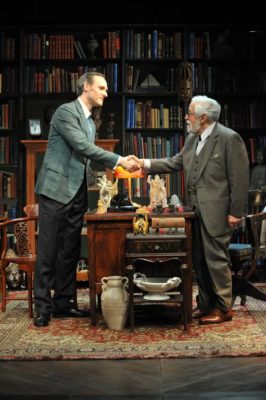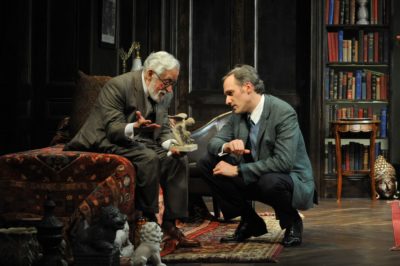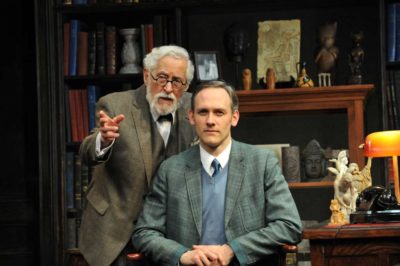Freud’s Last Session (Chicago cast)
 Written by Mark St. Germain (suggested by “The Question of God” by Dr. Armand M. Nicholi Jr.)
Written by Mark St. Germain (suggested by “The Question of God” by Dr. Armand M. Nicholi Jr.)
Directed by Tyler Merchant
At the Mercury Theater, Chicago
A mesmerizing look at two extremes that brims with wit and humor.
Note: Recently extended due to the extremely successful run of this dual portrait that has been a smash with audiences and critics, Session has been recast with Chicago natives, replacing the original New York cast (read Tom Williams’ review of the original Chicago premiere here). Full disclosure: Keen observers may note that I also reviewed it for another publication. This makes it a fascinating look at how a recasting can oh-so-subtly change the dynamic of a show even while retaining the same director. I think it’s safe to say it’s an expert hand-off.
There’s a website devoted to images of influential people in encounters both chance and intended. They range from Dean Martin and John Wayne to Andy Warhol and Salvador Dali. We can only imagine what it could have been like to have been flies on the wall at those encounters. It is just such a moment that is framed in Freud’s Last Session at Mercury Theater, which imagines two titanic celebrities at their most intimate, and gives us a studied glimpse into opposing forces clashing over equally titanic topics.
Called to the study of the dying Dr. Freud (Mike Nussbaum), the atheist-turned-Christian-apologist C. S. Lewis (Coburn Goss) arrives on the same day England declares war on Germany. He believes he has arrived for a dressing-down from the esteemed father of psychoanalysis for a recent parody he wrote of the good doctor. Instead, the middle-aged Lewis finds himself inadvertently embroiled in his own psychoanalysis. Freud wants to study specifically the manner in which a vehement non-believer like Lewis could become a devout Christian. What ensues is a delicate, often humorous philosophical parlay of sorts as the stakes of being proven “right” (or at least, of having the most sound logic) mount higher as the conversation delves into sex, life, good v. evil and the mysteries of the universe. All the while, the anxiety mounts for both men as they check the radio for news of the outside world, waiting breathlessly to see how events unfold. These same events feed back into the conversation itself, serving as a means of further exploration into the nature of Man and Existence.
St. Germain has taken the classic “what if they had met?” scenario and used it as a simple device through which to grapple with the questions that haunt so many of us. Like Plato inhabiting his mentor Socrates to pen a Dialogue, St. Germain speaks through these avatars to bring us a fascinating glimpse into the sort of civilized discourse (though never dispassionate, rest assured—these two crackle with zeal) so rare in the current national rhetoric wherein the participants express themselves with emotion and respect. Rather than solve any of the questions presented, he seems to want to illustrate the method by which minds are kept open to analysis rather than being shut down to avoid dissenting opinions. Lewis and Freud are never portrayed as anything less than simply sympathetic humans bound together by antagonism and a surprising amount of tenderness. Neither man is let off the hook, but it is Freud’s ever-so-slight obeisance to humility in the face of the mysterious that is most moving.
 The legendary veteran of the Chicago stage Mike Nussbaum takes up the role of Sigmund Freud (originated by Martin Rayner) with a masterful inhabitation of the legendary icon. It never borders remotely on caricature. His rasping voice (afflicted by the oral cancer that lead him to commit euthanasia two weeks later) and stilted movements have done nothing to dampen his dry humor and eviscerating analysis. Taking over as C. S. Lewis from Mark H. Dold, Coburn Goss has a slightly easier task because Lewis is known more for his written work than his personality. This doesn’t diminish from the skill needed to go toe-to-toe with the towering intellect twice his age and much more renowned, and Goss is adept at bordering between respect for his elder and a steadfast desire to not back down from his stance.
The legendary veteran of the Chicago stage Mike Nussbaum takes up the role of Sigmund Freud (originated by Martin Rayner) with a masterful inhabitation of the legendary icon. It never borders remotely on caricature. His rasping voice (afflicted by the oral cancer that lead him to commit euthanasia two weeks later) and stilted movements have done nothing to dampen his dry humor and eviscerating analysis. Taking over as C. S. Lewis from Mark H. Dold, Coburn Goss has a slightly easier task because Lewis is known more for his written work than his personality. This doesn’t diminish from the skill needed to go toe-to-toe with the towering intellect twice his age and much more renowned, and Goss is adept at bordering between respect for his elder and a steadfast desire to not back down from his stance.
With studies about critical analysis dampening feelings of faith, a political arena entrenched in doublethink and a world flooded with so much information that people are shutting down to avoid confrontation, Freud’s Last Session could not be more timely. By going back to our recent past, it portrays a present we wish we had. One where ideological conflict ends in a respectful handshake instead of a sound bite. That it does this in just over an hour is all the more astonishing. If all debates could be this real and riveting, maybe a few minds would change. Sure to prompt some interesting discussions, one can only hope it’s the lesson in an open-minded journey that persists on what may be an endless path of questions.
Highly Recommended.
Review by Clint May
At Mercury Theater, 3745 N. Southport Ave, Chicago, IL; call 777.325.1700; tickets $45-69 (discounted student and group rates available); performances Wednesdays at 2pm and 7:30pm, Thursdays at 7:30pm, Fridays at 8pm, Saturdays at 2pm and 8pm, Sundays at 1pm and 5pm; running time 85 minutes with no intermission.

